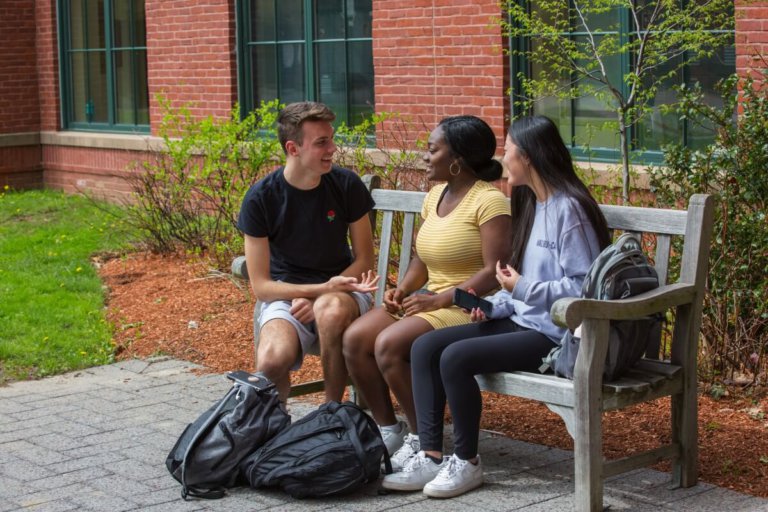
Worcester Academy is a home for many.
Many ethnicities and gender-diversity. Many religions. Many abilities, family structures, and a spectrum across socio-economic status.
“The focus on diversity, equity and inclusion is a foundational necessity as we support students and all community constituents from diverse backgrounds and lived experiences, who bring different ideas about the world to our school,” said Bonnie J. Walker. Interim Director of Equity and Inclusion at Worcester Academy.
“Welcoming, creating and sustaining a sense of belonging for all students, faculty and staff, is integral to creating an inclusive and equitable environment, and to the mission of the Academy.”
Worcester Academy, in the historical city of Worcester, Massachusetts is a private co-ed boarding school for grades 6 through 12 and postgraduates. It has a thoughtfully designed curriculum, a diverse range of extracurricular activities, an intensive athletics programme and theater programme, and a dedicated college counselling team.
These features result in a holistic, well-rounded education and boarding experience. The importance of making sure every student is included cannot be underestimated.
In this world-class school preparing world-ready graduates, it’s a given that students have to be in an environment that reflects the modern world. More women are in boardrooms, societal shifts have transformed homogenous societies, and more people who identify as LGBTQ are out — a school should reflect this reality.
Supporting each student to be their most authentic self and accepting of others, will propel them to thrive in their relationships, work, and life-long learning in the future. Being in a multicultural and diverse school teaches students cultural competency in real time, how to engage in spaces and with other students and adults from different backgrounds than their own. From a young age, they learn how to understand the social and emotional reactions and experiences of their peers, often unlike their own.
According to studies, students work better in a diverse environment. They concentrate more. With people from different backgrounds alongside them, they push themselves to do better. And with more differing viewpoints, they become more creative and collaborative in finding solutions.
In Worcester Academy’s English literature curricula, students see themselves in the curriculum and get to learn about people from similar and different backgrounds.
English Literature Chair Dana Huff describes the subject as both “a window and mirror”.

“We can learn about the experiences of others through the windows reading provides, and we can learn more about ourselves and see ourselves as we are through the mirrors reading provides,” she said. Another study in the journal “Child Development” found that friendships across ethnic groups in early adolescence help protect youths from feeling vulnerable, making them feel less lonely and at the same time safer.
Learning about different cultures and backgrounds makes students feel more comfortable with these differences. They are thus more comfortable with themselves and feel a deeper sense of safety.
“Students benefit when they take advantage of opportunities for cross-ethnic contact in forming friendships,” explains Sandra Graham, professor of human development and psychology in the Department of Education at UCLA, who led the study. “The composition of classrooms can play a facilitative role.”
At Worcester Academy, it’s not just classrooms that are designed to reap these benefits for students — it’s in all aspects of the school.
Every year, Academy students take part in the National Student Diversity Leadership Conference as well as regional conferences. On-campus, the Academy has affinity groups such as Gay-Straight Alliance (GSA); BSU (Black Student Union), Multicultural Affinity, Nuestro Vos (LatinX Affinity),; Student Activists and Allies;; and The Green Team.
Walker said, “We continue to buildout diverse networks, resources, and community partnerships, and a growing multicultural and anti-racist curriculum.
“We will recruit a more representative faculty and staff, reflective of the student body, and teachers who are innovative, adaptive, and culturally responsive.”
Each year, several members of the faculty also attend the Multicultural Teaching Institute. Over three days at the institute, Academy educators learn hands-on teaching tools to enrich their classrooms while expanding their ability to critically evaluate their personal limitations and implicit biases.
From spaces to programmes and initiatives, diversity, equity and inclusion drive everything that Worcester Academy does. It is starting to name the deep-seated roots of racism, prejudice, inequity and injustice in the Academy and in society.
Walker said, “We aim to develop more informed and innovative problem solvers in our students, who will successfully navigate a global economy, through tumultuous times.”
Follow Worcester Academy on Facebook, Twitter, YouTube, Flickr and Instagram
Liked this? Then you’ll love…
Worcester Academy: Getting into your dream college starts here
Worcester Academy: Where students flex their academic and athletic prowess







